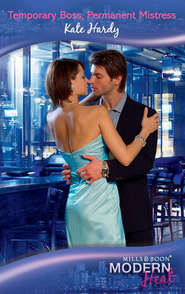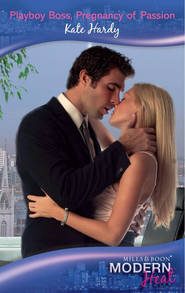По всем вопросам обращайтесь на: info@litportal.ru
(©) 2003-2024.
✖
Where The Heart Is
Автор
Год написания книги
2019
Настройки чтения
Размер шрифта
Высота строк
Поля
HIS hair was the first thing she noticed. Down to his shoulders, dark and with the tiniest wave to hint that, when short, it curled. Antonio Banderas as El Mariachi, Rowena thought. Beautiful. Her fingers itched to touch it.
As if he’d felt her staring, he turned round. Glanced her way, just for a moment—but enough for her to note that his dark eyes held shadows. Shadows even deeper than her own.
She shook herself. He was a stranger. Though admittedly he was the most gorgeous man she’d ever seen—the most gorgeous man any of the other women in the airport had seen, too, judging by the looks he was attracting. Tall, dark and dangerous, with a mouth that promised paradise, dressed in black, he was every woman’s fantasy.
Then she realised his gaze had returned to her. There was a faint question in his eyes; she gave the tiniest shake of her head. The attraction might be mutual, but nothing was going to come of it. She’d bet serious money that he had a wife and kids at home. Despite that faint air of danger, Rowena thought, he was the type. A family man.
And she most definitely wasn’t a family woman.
She hauled the backpack onto her shoulders, ready to join the rest of the group. Carly, the woman she’d sat next to on the flight out, smiled nervously at her. ‘I can hardly believe we’re here in Santiago, over seven thousand miles away from London.’
‘Well, it’s what we’ve been waiting for. Training for,’ Rowena reminded her, returning her smile. ‘Though there’s still a four-hour flight to go.’
‘And then the coach trip. Six hours, the information pack said.’ Carly grimaced. ‘I hate coach travel. It always makes me sick.’
Rowena was just about to ask if Carly had bought some travel sickness tablets before she’d left England, when she remembered. Right here, right now, she wasn’t Dr Thompson, registrar in the emergency department at the Queen Elizabeth Hospital, Manchester. She was just plain Rowena Thompson, in Chile with a group of people who were doing a one-hundred-kilometre trek through the Torres del Paine National Park in Patagonia to raise money for leukaemia research. If she admitted to medical knowledge, either she’d get annexed as one of the trip’s medical officers—which wasn’t what she wanted—or she’d have people sidling up to her, wondering if she could just give them a bit of advice about a long-standing health niggle or ‘just take a quick look at’ yada, yada, yada.
In another time, another place, she’d have obliged. But not now. The next ten days were for Peggy. And nothing, but nothing, was going to distract Rowena from raising an obscene amount of money. Money that still wouldn’t be enough to find an instant cure for leukaemia. Money that wouldn’t bring Peggy back. But she had to believe it would help. That it would stop someone else feeling as if part of the sun had gone out when someone they loved died from the disease. Because maybe, just maybe, if enough people raised enough money, researchers would finally find a cure.
She shook herself. No doom, no gloom. Peggy had been like sunshine, even towards the end. In the last week she’d admitted to ‘not feeling myself today’. Everyone had known what she’d really meant. She’d known she was dying. They’d smiled in front of their friend and colleague, then left the ward, leaned against the wall in the corridor and wept. Raged at the injustice—that the best emergency nurse they’d ever known had been dying from a disease that couldn’t be cured. And then they’d gone back to the emergency department and got on with their jobs. True professionals who’d ignored the fact that they were bleeding inside and concentrated on their patients.
‘Sit near the front, try to get a window open if you can, and keep your eyes straight ahead,’ Rowena offered.
‘And don’t think about the way the coach lurches round the bends,’ Carly said with a grimace. ‘Yeah.’ Then her eyes widened. ‘Wow. Is he with us? How did I miss him in London?’
Rowena knew exactly who she’d see, even before she glanced briefly over her shoulder. ‘He’s probably one of the guides.’ He looked Chilean—those deep dark eyes, that olive skin—as did the people he was talking to; she could hear the odd Spanish word she recognised in their conversation. QED: he was a native.
‘Mmm. Well, that’ll keep my mind off the coach journey. Maybe I’ll end up sitting next to him,’ Carly said hopefully.
‘Maybe.’
Rowena had intended to catnap on the four-hour flight, but the view from the window was too good to be missed—a spectacular view of the Andes, and then the dramatic ice fields. Strange to think that when she’d left home yesterday, it had been the middle of an August heat wave, at almost thirty degrees centigrade. Where she was heading, she’d be lucky if it got above two degrees. She smiled to herself. Everyone had said she was mad, planning to trek through Chile. And when the heat wave had started three days ago, they’d added she was raving mad, to give up on a rare English summer.
At Punta Arenas, the group boarded an elderly coach to take them to Puerto Natales. She was the last to take her seat—and, to her shock, the only space left was next to Mr Gorgeous.
Hadn’t Carly been dying to sit next to him? And, anyway, why wasn’t he sitting with the other trek organisers? Stifling the tingle of panic in her stomach, she sat down.
A six-hour trip. Next to a man whose smile had turned every female knee in the vicinity to jelly. Including her own.
Oh, boy.
‘Buenas dias, señora.’
Rowena didn’t bother correcting him to señorita; she simply smiled back. ‘Good afternoon.’
‘Good afternoon. My name is Luke,’ he said, in perfect, unaccented English.
Not what she’d expected. But, then, if he’d been a guide for a reasonable length of time, of course he’d speak perfect English. Probably French, German and Italian as well. ‘Luke’ was probably the Anglicised version of his name.
‘Luke MacKenzie.’
MacKenzie? No way was that a Chilean surname. The surprise made her meet his eyes—and then she wished she hadn’t, because awareness of him turned her stomach to water. Hell and double hell. This wasn’t supposed to happen.
And now he was waiting for her to tell her his name. She could be rude and just ignore him—but she’d still have to sit next to him for the next six hours. He’d probably guess why she was ignoring him, too: that she was trying to suppress the spark of attraction towards him. She decided to play it safe, be polite and throw a much-needed barrier between them. ‘Rowena Thompson.’
Then she made a second mistake. She took his outstretched hand. A brief clasp, a polite handshake—the English way—and yet it felt as if the contact had been much, much more intimate. As if he’d drawn her hand up to his lips, kissed the back of her hand, then turned her palm over and licked the pulse at the base of her wrist.
She felt a muscle work in her jaw. This wasn’t good. She didn’t want to react to him like this. Didn’t want anyone in her life. Not now, not in the future. Not ever.
‘Welcome to Chile,’ he said softly.
‘You…live here?’ she croaked, cursing her voice for letting her down. For telling him that she was affected by him.
‘For the moment.’
So he was an Englishman abroad. He looked the outdoor type. She definitely couldn’t imagine him working in an office, or any place where he’d be trapped indoors, away from the elements. ‘You’re one of our guides?’ she guessed—merely making conversation.
‘Trek medical officer,’ he said.
Luke MacKenzie was a doctor?
The surprise must have shown on her face because he shrugged. Just one shoulder, as if he’d come across this reaction so many times that he was bored by it. ‘Don’t let the hair fool you,’ he said softly. ‘I’m qualified.’
Her face burned. ‘I, um, didn’t mean to be rude.’ This was where she should offer information in exchange. I’m a doctor, too. But the words stuck in her throat, again. Right here, right now, she wasn’t a doctor. She was a fundraiser. And she was going to do this properly. Keep everything compartmentalised and under control. ‘Is this your first trek?’ she asked politely.
He smiled again, though there was something odd about his smile—something she couldn’t put her finger on. ‘No. I’ve been working here for a year.’
A year spent outdoors. No wonder his skin was that beautiful shade of olive: caused by the sun, rather than a Spanish heritage. But why would a trained doctor spend a year out here? Or had he been on secondment to a hospital in Santiago and this was his last chance to see the ice fields before he went back to England?
She shook herself. It was none of her business. Maybe he’d left England because he hated all the administration and politics that were slowly strangling hospitals. The latest one—a European Directive to limit the hours they worked—was going to cause even more chaos, and George, their consultant, was neck-deep in paperwork. To the point where he’d threatened to take early retirement and everyone knew he actually meant it.
‘Is this your first trek?’ Luke asked, throwing her question back at her.
She nodded. ‘Though I’ve been in training.’ On the Pennines. Every day off, for the last four months, she’d spent walking uphill and down, across scree and uneven paths, breaking in her walking boots and increasing her strength—in between running events to raise the sponsorship the charity had asked her to find to cover the minimum of her costs for the trip. Once word had spread about what she was doing, she’d raised more than those costs from the emergency department alone. Ex-patients who remembered Peggy had read the story in the local paper and sent donations. And one six-year-old boy had even sent his pocket money along with a note in wobbly childish handwriting, a gift which had brought a lump to her throat and tears to her eyes.
‘I hope everyone else has been as sensible.’
‘Hmm?’
‘We always get at least one,’ Luke said. ‘The type who was too busy to do any training, even in the gym, before flying out here. A hundred kilometres isn’t far. Split over eight days, that’s about two hours’ walking a day.’
‘On level ground, maybe.’ Rowena had read her information pack thoroughly and knew the truth. They’d be walking for up to eight hours a day, over a wide variety of terrains.
‘So we end up with…’
He paused, and Rowena almost fell into the trap. Almost listed the most common injuries—blisters, sprains, strains. And if the novice trekkers were unfit, overweight and not wearing proper shoes, probably a case of plantar fasciitis as well—damage to the tissue that stretched from the heel to the toe. Fascia tissue took months to heal, and plantar fasciitis often needed a steroid injection into the heel to cure it.
‘A problem for you,’ she finished.











